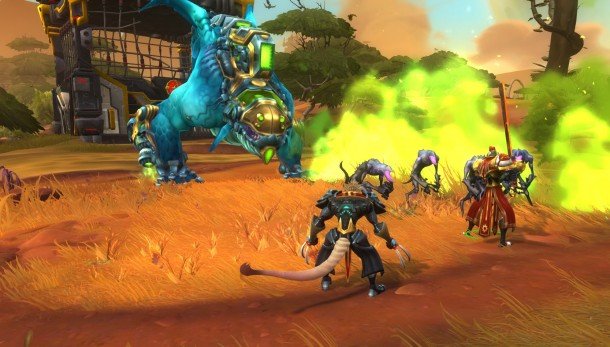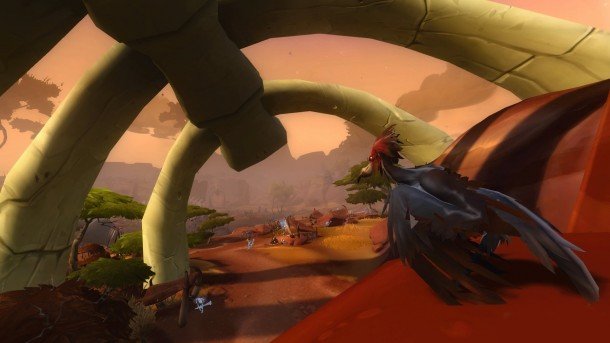Wildstar hands-on: have Carbine created the perfect second MMO?

I'm standing at the edge of the Deradune hunting grounds with a million things to do. I've been playing MMOs like WildStar for more than a decade but, while I'm capable of parsing the approximate meaning of all of the buttons and objectives presented to me, I have no idea what I should do first. I have two options: the first is to lean on my experience of other games and progress by inches, ensuring that I don't drop off the critical path – but I've been there, and done that. The other option is to start running for the horizon and see how well the game can keep pace. I start running.
"You find yourself battling a pack of ravening space panthers one moment and a circling enemy gunship the next."
Deradune is the starting area for the Draken, a race of horned beastmen who form the militaristic vanguard of WildStar's imperious Dominion faction. The zone itself is modelled on the African savannah. Winding paths link scattered towns, with prey species wandering the open spaces and predators lurking in the treeline. WildStar sits square on the boundary between science fiction and fantasy – spaceships might populate the skyline of the game's single planet, Nexus, but on the ground swords are just as common as lasers. You're liable to find yourself battling a pack of ravening space panthers one moment and a circling enemy gunship the next.
The game has a bright, heavily stylised design, with action-figure characters and landscapes painted in broad, colourful strokes. Animations are exaggerated and impactful, from the lolloping run of the Draken to the full-body coil that telegraphs an incoming enemy attack.
I'm playing as a Mechari warrior, an eight-foot robot wielding a two-handed energy sword. In addition to my class, which determines how I go about killing things, I've also chosen a path – in this case, that of the soldier – that determines why. In WildStar, your path provides a set of extra objectives that are available exclusively to you and that shape the course you'll take on the way to the level cap. Other paths include the scientist, who focuses on analysing monsters; and the settler, who is encouraged to play socially. There's also the explorer, but I'll get to that later.

Running through the town gates, I pass a quest giver of the traditional sort. A little way beyond her is a computer terminal that dispenses an additional, path-specific mission – in this case, I'm given a pile of grenades and a mandate to test them on the local monkey population. There's also a public quest in the area, asking players to place any skulls they've looted on a trophy pile in the centre of town.
"The game bends to accommodate my momentum – working in smart ways to ensure that I don't miss out."
On the way to the first cluster of monkeys, I receive a phone call from a quest giver I'd ignored, filling me in on her requirements and adding another objective to my tracker. The sense I get is of the game bending to accommodate my momentum – while I'd probably have been better off approaching Deradune more methodically, the game works in smart ways to ensure that I don't miss out. This isn't an accident: according to executive producer Jeremy Gaffney, the way that experienced MMO players approach content has been a major influence on WildStar's design.
“Most people have an MMO they played and loved,” Gaffney says. “But were they able to teleport back to the MMO they so blissfully remember, would they really put up with the stuff they put up with the first time? I loved EverQuest, but I had to stand in line for mobs. Would I be willing to put up with that now that I've played so many other MMOs?”
The biggest gaming news, reviews and hardware deals
Keep up to date with the most important stories and the best deals, as picked by the PC Gamer team.
The answer – as evidenced by WildStar's attitude to content – seems to be no: hence multiple progression paths, quests branching from other quests and new things to do at every turn.
Joining in 2011, Chris made his start with PC Gamer turning beautiful trees into magazines, first as a writer and later as deputy editor. Once PCG's reluctant MMO champion , his discovery of Dota 2 in 2012 led him to much darker, stranger places. In 2015, Chris became the editor of PC Gamer Pro, overseeing our online coverage of competitive gaming and esports. He left in 2017, and can be now found making games and recording the Crate & Crowbar podcast.


